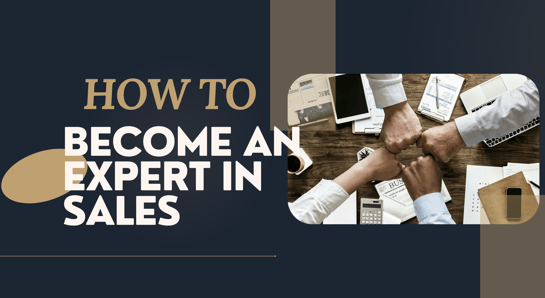How to Become Expert in Sales
FEATUREDEDUCATION


The article covers various essential aspects of becoming a proficient salesperson, including understanding products/services, recognizing customer needs, targeting decision-makers, fostering trust and communication, maintaining professionalism, and the importance of follow-up.
Too Much Information Leads to Tough Decision-making
In today's competitive world, selling has become more challenging than ever. With the advent of the Internet, customers have become savvy buyers, as they have more information available at their fingertips.
However, this abundance of information also leads to overload, making customers indecisive. Nevertheless, this presents an opportunity. By mastering the art of guiding clients through the complexities of choice, sellers can become their customers' trusted advisors, forging lasting partnerships built on trust and expertise.
Understanding your product or services
Such a basic question, yet often overlooked. I have observed many people, including top-level executives, who sell their products without fully understanding them. They believe they are selling one thing, but in reality, it's quite different. For instance, when a bar offers a drink, the product isn't just the drink itself. If someone wants to buy a drink, then it would be cheaper to buy the drink from a Wine Shop rather than at the bar. However, the bar sells much more than just the drink. It is selling ambiance, a social atmosphere, attentive staff service, and essential facilities like restrooms and electricity.
Similarly, when a bank charges a fee for maintaining an account, it's not just for the account itself. The fee includes various facilities such as staff costs, ATM access, card services, internet and mobile banking, and, most importantly, the assurance that your money is safe. Therefore, it's essential to understand precisely what product we are offering to our customers.
Thus, Research your products and about the competition. Knowledge is the key to becoming a good salesperson.
Understand the Customer’s needs
Many salespeople start a conversation by telling the customers what the product offers and why they should buy the product. But they forget the fundamental question, what are the customer’s needs?
For instance, consider a wealthy customer who already owns two cars for personal use and has two parking spaces. In this scenario, attempting to sell another car to this customer would be futile, as the customer lacks the necessary parking space. Therefore, understanding the customer's specific needs is crucial for effective sales.
However, the salesperson should listen to what the customer wants and how they can align their goals with those of the customer.
For example, when customers come to me for tutoring for their children, I ask them how their children are currently learning and what problems they encounter. I delve deeper into their current issues and strive to provide the best solution for them.
Thus, become proficient at listening and start questioning your customers. Ask the tough basic questions that will provide insight. Just remember, Ask, Ask, and Keep on Asking.
Know who is the decision maker and aim at higher-level executives
Pitching a product to a person who cannot decide doesn’t make any sense. Salespeople must conduct thorough research to identify the decision maker. They can go through the organizational charts, ask people in the company about the decision-maker, or use their existing relationships.
While lower-level employees may provide valuable insights and recommendations, targeting higher-level executives is crucial for gaining buy-in and securing large-scale deals. These executives typically have the authority to approve budgets, allocate resources, and authorize significant deals. Engaging with them allows sales professionals to present the value proposition directly to those capable of making decisive choices.
Trust, Communication, and Aspiration to Higher Goals.
Sometimes, the best solution (Aspiration to Higher Goals) may result in the customers not opting for my services. I will inform (Communication) the customer about that solution. I may lose that customer but I will build trust with that customer. This is very important in business. A Good business is a business that focuses on the long-term and not just small-term solutions. Relationships are far more important. A salesperson should focus on the Win-Win situation for both parties.
Do the Basics and Small things correctly.
The moment you step out of your house, you are always judged. Even while you are walking on the street, you may pass a person who may provide you with good potential business in the future. Thus, every step outside your door is an opportunity to make an impression. Whether strolling down the street or meeting a potential business contact, always present yourself well-dressed and prepared for any encounter.
Don’t be Late. Punctuality is essential in both professional and personal settings. Arriving on time shows respect for others' schedules, demonstrates professionalism, builds trust and reliability, minimizes stress, and sets a positive example for others. Being punctual fosters stronger relationships and contributes to a more positive and productive environment overall. On the other hand, if you are not punctual, you will never be taken seriously.
Follow-up after Sales
Following up allows you to gather valuable feedback about your products, services, and overall customer experience. This feedback can inform you on how to improve your product, refine your strategy for future sales, and, more importantly, build better relationships with your customers. It can help in acquiring new leads and in upselling and cross-selling to your existing customers
